Don't know if she was CIA, but she sure was good looking
author
Vitaliy Vassylevskiy
Vataliy was born in 1958 in Alma-Aty (Kazahstan), in a well-off Soviet family. During an American photo exhibition in 1976, in Alma-Ata, he met an American girl named Jeanna, who moved into his parents’ flat with him for a month, which attracted suspicion. Later, inspired by his American ex-girlfriend to move far from home, Vitaliy went to Lviv to study architecture at the University there. In 1979, he went to Poland with one of the student work brigades that were very popular at that time. That trip convinced him that life in the USSR was like living in prison.
Postcard
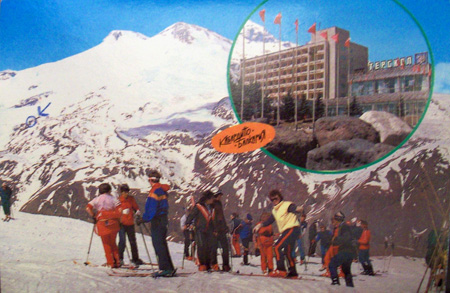
- Elbrus
- Elbrus is a popular ski resort in the Caucasus Mountains. Vitaly lived there for a few months to get his ski instructor license. The arrow points to where he was living.
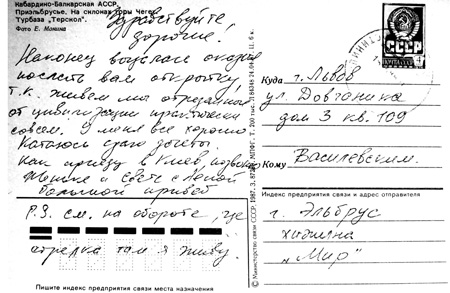
- Elbrus
- Elbrus, USSR, 1988
- Lviv
- To: Lviv, Dovghonik Street, b.3, app. 109 to Vassilevskys USSR Lviv is a city in western Ukraine. The city is considered to be one of the main cultural centres of Ukraine.
- Postcard Text
- Hello, my dear! Finally I have an occasion to send you a postcard, for we are living here practically cut from the civilization. I’m doing well, I’m skiing a lot and I’m passing my credits. As soon as I return to Kiev, I’ll give you a phone call. Give my love to Zhenka, Sveta and Lena P.S. Look at the reverse, there is an arrow pointing to the place where I live
personal archives
Skiing in Elbrus
Vassilevsky as a downhill ski instructor.
country: German Democratic Republic / year:
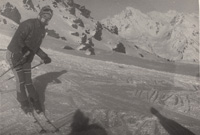
Vassilevsky as a ski instructor. Ever since he was a child Vassylevsky had been very keen on skiing. A professional athlete, he attended a training course in Elbrus to became a downhill skiing instructor but two years later, in 1991, the Soviet Union collapsed, and Vitaliy was forced to emigrate to Poland to find work.
A beach for foreigners
Vitaliy at the beach in Alushta, Crimea
country: Soviet Union / year:
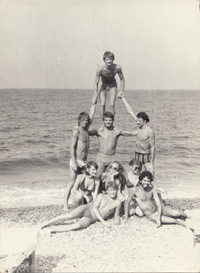
Vassilevsky at the beach in Alushta, Crimea. In the Soviet Union, there were special beaches reserved for foreigners. Soviet citizen were not allowed to use them, but Vitaly managed to sneak in by speaking Polish with his friends. He remembers that these beaches were much cleaner and more well-maintained, and there were even disc jockeys providing entertainment.
Family Portrait
Vassylevskiy with his family in the 60s
country: Soviet Union / year:

Vassylevskiy with his family in the 60s. Vassylevskiy grew up in Kazakhistan in a family with Polish origins. After the war, in order to escape the famine in Ukraine, his father moved to Alma Ata, where he had some relatives. In the 30s, many Poles from western Ukraine had been sent off to Kazakhstan to develop the region and impose Russification of the region.
Andreevsky slope in Kiev
Vassilevskiy selling his water paintings on the Andreevsky descent (St. Andrew’s Hill) in Kiev.
country: Soviet Union / year:
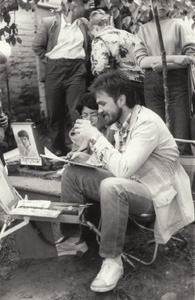
Vassilevskiy selling his water paintings on the Andreevsky descent (St. Andrew’s Hill) in Kiev. Private business was illegal in the Soviet Union, but starting in 1983 or 1984, during Day of the City celebrations, a spontaneous marketplace sprang up at St. Andrew’s Hill. Sculptors, carvers and painters came to sell their works. Until then, only members of the Union of Artists had been able to sell their work. The market was a success, and “in two days one could earn a decent amount of money for those times, three or four or five hundred rubles for finished work."
A somovar for a pair of jeans
Vassilevskiy with his friends in Alma Ata.
country: Soviet Union / year:
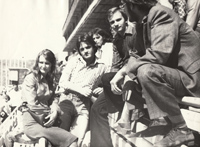
Vassilevskiy with his friends in Alma Ata. In the 1970s, Alma Ata was a wealthy, modern, multi-ethnic, city. Vitaliy and his friends were quite open to western influence, in both music and fashion. Getting western-style clothes was not easy though. The jeans Vitaliy’s wearing in this photo come from a friend from East Germany – but he had to trade a ‘real Russian samovar’ to get them.